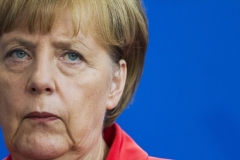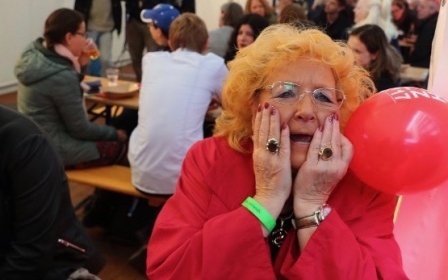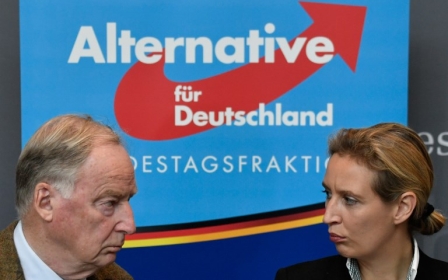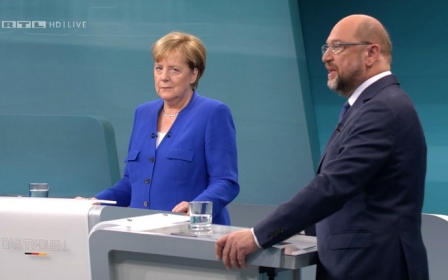Merkel agrees to German migrant cap to pursue coalition government
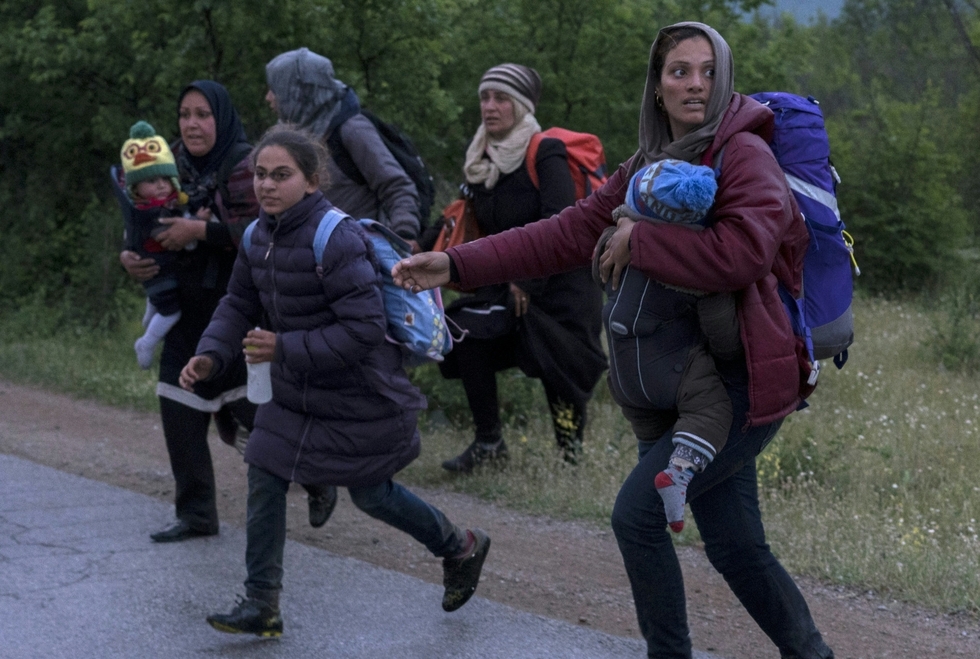
German Chancellor Angela Merkel's Christian Democrats (CDU) reached a deal on migrant policy with her conservative Bavarian allies on Sunday, removing a major obstacle to pursuing talks on a coalition with other parties.
In an apparent concession, Merkel agreed to put a number on how many people Germany would accept per year on humanitarian grounds, namely a net total of around 200,000 individuals.
The CDU and Christian Social Union (CSU) reached the migrant deal after about seven hours of talks and later adjourned their meeting. It was unclear whether they had agreed on other issues, such as Europe and pensions. Further details will be made available at a news conference on Monday.
Merkel won a fourth term as chancellor in a 24 September election but was weakened by heavy losses to the far right.
She wants to build a coalition between her conservative bloc and two other parties, the pro-business Free Democrats (FDP) and the Greens, which are far apart on issues from tax and energy to Europe.
First, however, she must get her own house in order and overcome some major differences between her CDU and the CSU, its sister party in Bavaria, a state that accounts for 15 percent of Germany's population.
The two parties have formed a parliamentary bloc together for decades, but have diverged over migrant policy since Merkel left the border open to a huge wave of migrants in 2015, most of whom entered the country through Bavaria.
The CSU has demanded a cap on refugees, but Merkel has resisted that, arguing it would breach Germany's constitution, which guarantees the right of asylum to anyone facing political persecution.
Under the face-saving compromise brokered on Sunday, Germany would accept a net of about 200,000 people a year on humanitarian grounds, including families of refugees already in Germany. Authorities will not turn people away at the border, however, and the parties avoided using the term "upper limit" that Merkel has consistently rejected.
"We want to achieve a total number of people taken in for humanitarian reasons (refugees and asylum seekers, those entitled to subsidiary protection, family members, relocation and resettlement minus deportations and voluntary departures of future refugees) that does not exceed 200,000 people a year," states the agreement.
The leaders also agreed they wanted to set up centres where asylum seekers would stay until decisions on their applications were made. Rejected asylum seekers would be returned to their home countries.
They also agreed to declare Morocco, Algeria and Tunisia as countries of safe origin, meaning Germany can return rejected asylum seekers there more easily.
"It is a good day for the conservatives and a good day for Germany," CSU General Secretary Andreas Scheuer said after the talks.
Setting a number is a climbdown for Merkel and may not be acceptable to the Greens.
"This is an agreement between the CDU and CSU and far from the result of exploratory talks for a coalition with the FDP and Greens," said Greens co-leader Simone Peter.
The target looks achievable, however, given that the number of people arriving in Germany fell to about 280,000 last year from 890,000 in 2015. A further drop is expected this year.
In addition, the two parties agreed to push for an immigration law that would give priority to migrants with skills to plug gaps in the labour market. There is broad support for that from the FDP and Greens.
Fearing heavy losses to the far-right Alternative for Germany (AfD) in a state election next year, the CSU has dug in its heels on the issue of a cap to the number of migrants.
The stakes are high for the CSU's combative leader, Horst Seehofer, who is fighting for his political survival after a poor election performance. The CSU slumped to 6.2 percent, measured nationally, from 7.4 percent in 2013.
Once the CDU and CSU have agreed on all their policies, they can start exploratory talks with the FDP and Greens.
It could still take months to get a full coalition deal and investors are concerned about the prospect of a policy standstill in Europe's biggest economy. If no deal is reached, the prospect looms of either a minority government or new elections.
New MEE newsletter: Jerusalem Dispatch
Sign up to get the latest insights and analysis on Israel-Palestine, alongside Turkey Unpacked and other MEE newsletters
Middle East Eye delivers independent and unrivalled coverage and analysis of the Middle East, North Africa and beyond. To learn more about republishing this content and the associated fees, please fill out this form. More about MEE can be found here.


